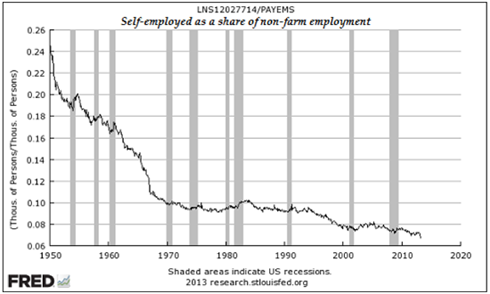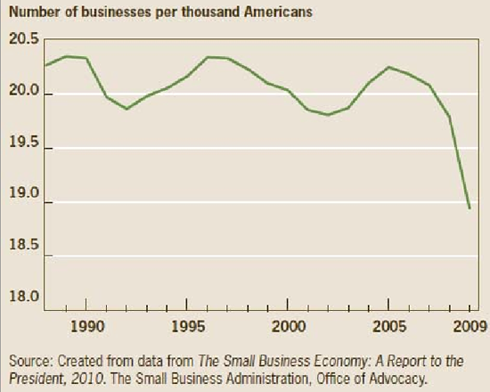Via Jim Quinn's Burning Platform blog (authored by Paul Rosenberg of FreemansPerspective blog),
Let me be blunt: Our capitalist system is approaching failure.
Or, perhaps better said: Our marginally capitalist, partly-free market systems are approaching a massive collapse.
Not because of what capitalism is, mind you, but because the powers that be have bastardized it.
Capitalism can bear many distortions and abuses, but it is not indestructible.
And, make no mistake, the ‘capitalist’ system we have today has been massively corrupted, so much so that it’s sagging under the load... and will continue to do so until the proverbial straw breaks its back.
The 9 Plagues
1. The average producer is being stripped bare. In the US, for example, the total take of taxes has not risen dramatically, but fewer and fewer people actually pay them. There was a big uproar during the last election cycle over the fact that 47% of working-aged Americans paid no income tax. That means that the half who do work (read suckers) are paying the whole. And more than that, they are also paying for the many millions who are on food stamps and disability. Producers are being punished and abused, made into chumps.2. Thrift is essentially impossible. I’ve explained this in detail previously, but a hundred years ago, it was possible for an average person to accumulate money. Mechanics, carpenters, and shop owners slowly filled their bank accounts with gold and silver. It was common for them to make business loans and to retire comfortably. But now, all of our surplus is drained away to capital cities, where it is poured down the drains of welfare, warfare, and political lunacy. Money has been removed from the hands that made it, and moved into the hands of non-producers, liars, and destroyers.3. In 2008, US federal government regulations cost an estimated $1.75 trillion, an amount equal to 14 percent of US national income. Let me restate: Simply complying with regulations costs American businesses more than $1,750,000,000,000 (that’s $1.75 Trillion) every year. This, again, is money taken out of production and wasted on political lunacy.4. Small businesses are being squeezed out. Take a look at the two graphs below, and understand that as small businesses are squeezed out, only the large corporations remain. These days, only the largest and best-connected entities are able to get their concerns dealt with (by the politicians they fund). Small operations are cut off from the redress of their grievances and are crushed by taxes and regulation. And don’t forget the comments of Mussolini:Fascism should more properly be called corporatism, since it is the merger of state and corporate power.While there may be no dictator, state/corporate partnerships are taking over commerce in the West.5. The military industrial complex is out of control. Their lobbying, fear-mongering, and spending can only be characterized as obscene. Dwight Eisenhower was right when he warned us about this in 1960. It is sad beyond measure that so few Americans took him seriously. Trillions of dollars and millions of productive lives are being spent on the war machines of the West. Never forget that wars destroy massively and produce nothing.6. All the Western nations now feature large enforcer classes, composed of bureaucrats, law enforcement units, inspectors, and so on. In the US alone this amounts to several million people – none of whom produce anything, and all of whom restrain producers from producing. Millions of people are paid to restrain commerce.7. We now have a very large financial class in which blindly aggressive people make millions of dollars. The problem is that finance is not productive. It may allocate money in beneficial ways (though it often allocates mainly to itself), but it doesn’t actually produce anything. At present, the allocators get the big bucks, and the producers get scraps.8. The modern business ethic has become about acquisition only. In more enlightened times, it was also about creating benefit in the world, or at least creating newer and better things. Mere grasping is an insufficient philosophy for capitalism; it leads to dark places.9. Every nation on the planet is using play money and forcing their inhabitants to use their play money. Moreover, they have super-empowered a small class of Central Banking Elites, who make fortunes on their currency monopolies, and who are entirely unknown to the producers who unwillingly (and unknowingly) purchase jets and yachts for them. Our money systems have brought back aristocracies; a class that is both hidden and immensely powerful.
So What’s Next?
That’s up to the producers. Everything hinges upon them. The game, as it is, depends entirely on them being willing to accept abuse.
All that is necessary to fix this is for the producers to stop being willing victims. Simple, I know, but there is a problem with such a sensible idea:
The producers are convinced that their role in life is only to struggle and obey.
Modern producers believe that the ruling classes have a legitimate right to tell them how much of their money they are entitled to keep, which charity causes they’ll be forced to contribute to, which features their car is required to have, and much, much more. Why? Simply because those other people are in “high positions,” and they (the producers) are in “low positions.” An evil assumption has been planted in their minds:
It is right for important people to order me around.
The productive class holds all the real power, but they are nearly devoid of moral confidence. So, they are abused without end.
Right now, a parasitic ethic rules the West and will continue to rule so long as producers play the part of the suckers. If this continues, what remains of capitalism will grind to a halt and will be overrun by a Neo-Fascist arrangement – not the dictator and swastika variety – but one where the state and powerful business interests merge into one unstoppable and insatiable force.
On the other hand, if ever the producers wake up from their moral coma and reject the role of doormat, they will build a society embodying the ethics of production. It almost sounds impossible, I know. But it is has happened before and could happen again.
It’s up to us.

